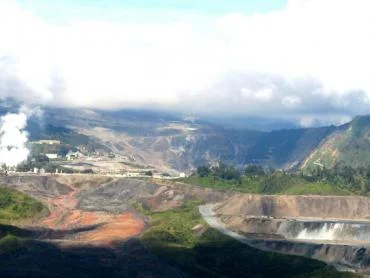Killing, rape, forced eviction and environmental destruction in Papua New Guinea
Canadian company Barrick Gold Corporation was involved in alleged abuses related to its Porgera Joint Venture (PJV) gold mine. PJV security personnel are implicated in human rights violations said to have taken place over many years, including beatings and killings of local men, and beatings and rapes, including gang-rape, of local women. Link to page 2.3.3
In 2011, MiningWatch Canada and local NGOs brought a complaint against the Canadian mining company Barrick Gold Corporation in respect of its operations at the Porgera Joint Venture (PJV) gold mine in Papua New Guinea (PNG). RAID and EarthRights International (ERI) are advisors on the case.
The complaint, submitted to the Canadian National Contact Point of the OECD Guidelines on Multinational Enterprises, alleges widespread human rights abuses by PJV security personnel over many years, including beatings and killings of local men, and beatings and rapes, including gang-rape, of local women. It also states that the living conditions of people in the area of the mine are incompatible with human health and safety standards. In 2009, the PNG Defense Force evicted local landowners near the mine by burning down houses.
In addition, there are allegations of ongoing environmental destruction. The PJV mine disposes of nearly 20 tonnes of tailings and sediment each year into local river systems, polluting the water and endangering public health.
Mediation
The Canadian NCP accepted the complaint, and Barrick agreed to negotiate with the complainants, though it took a year to agree on a mediator. By the time of the first mediation meeting in November 2012, Barrick had put in place a remediation framework for rape victims. However, the company did not make the details available for complainants to consider in advance of the meeting. When the victims finally received a copy, they were deeply concerned that Barrick was asking them to sign away their rights to possible future legal action in order to access remedies from the company.
Stipulating that a negotiated agreement is in full and final settlement is standard practice, which gives certainty to both parties and stops plaintiffs seeking compensation more than once for the same grievance. However, the waiver that Barrick proposed went well beyond the standard agreement, requiring victims to undertake not to participate in any legal action against PJV or Barrick. This wording implied that victims would not be able to take part in criminal proceedings against the company, to act as witnesses in civil actions brought by other victims who chose not to settle, or to pursue civil claims against the company in respect of grievances unrelated to the settlement agreement.
RAID had additional concerns about the remediation framework. For example, only women who had been raped by PJV employees were eligible. This criterion excluded those women who had been raped or gang-raped by members of police Mobile Squads who were being housed, fed and supported by PJV on PJV property.
NGO advisors excluded from the process
In January 2013, following consultation with the mediator in order to avoid any inadvertent disclosure of confidential material, MiningWatch Canada, RAID and ERI issued a carefully worded press release explaining their concerns with Barrick’s offer. Barrick responded by threatening to withdraw from the mediation process unless MiningWatch Canada, RAID and ERI were excluded.
In order to protect the victims’ ability to continue with mediation, the NGOs reluctantly withdrew from the process. Mediation between the local complainants and Barrick continued. In May 2013, Barrick proposed an amended waiver, whereby a victim of sexual violence who settles with the company will not also pursue civil legal action in respect of the same complaint. In line with the recommendations of RAID and others, the new wording allows victims to participate in criminal proceedings as well as to instigate civil action in respect of unrelated complaints that they may have.
The company denies liability.
Consequences for company ethical profile
In May 2013, the New Zealand Superannuation Fund, which invests money on behalf of the Government, excluded Barrick Gold Corporation from its $22 million investment portfolio on responsible investment grounds. The Fund views Barrick’s activities as inconsistent with UN human rights and environmental standards for business. Given the lengthy period over which problems have continued, and the slow progress made by the company in resolving community grievances, the Fund formed the view that ‘engagement with Barrick would be unlikely to be successful’.

